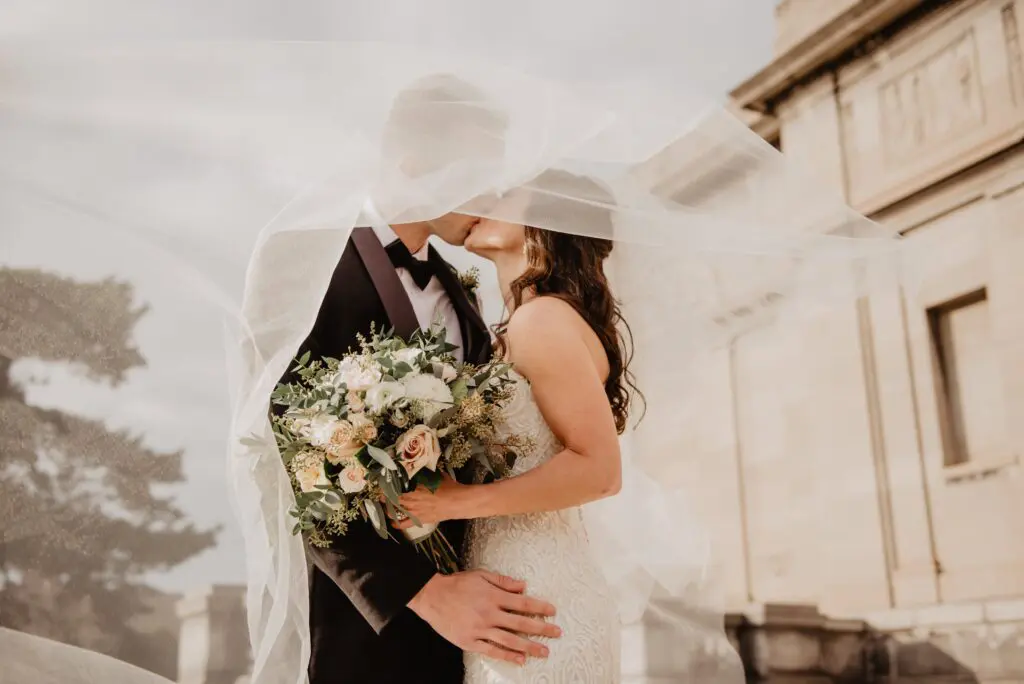Couples have options beyond the traditional public ceremony. One alternative gaining popularity is a confidential marriage license. While it offers some benefits, it’s important to understand the potential drawbacks and implications before making a decision.
Exploring the disadvantages of confidential marriage licenses. Although confidentiality may seem appealing, there are certain trade-offs to consider. Firstly, choosing a confidential marriage means sacrificing the public recognition and celebration that often accompanies a traditional wedding ceremony. Obtaining this type of license could raise questions about your relationship status and identity in certain situations.
Understanding the implications of choosing a confidential marriage. Privacy is one of the main advantages of going for a confidential marriage license, as it allows partners to keep their personal information out of public records. However, it’s crucial to weigh this against potential challenges in legal matters or when dealing with institutions that may require proof of marital status.
Understanding Confidential Marriage Licenses
Confidential marriage licenses serve a distinct purpose. Let’s delve into the details of these licenses and explore how they differ from public ones, as well as the requirements for obtaining them.
Definition and Purpose of Confidential Marriage Licenses
A confidential marriage license is a legal document that allows couples to wed without their nuptial information being made available to the general public. This type of license is often chosen by individuals who value privacy and wish to keep their marriage details confidential.
The primary purpose of a confidential marriage license is to provide an alternative option for couples who desire a more discreet union. By opting for this type of license, couples can safeguard their personal information, such as addresses and dates of birth, from becoming publicly accessible.
How Confidential Marriage Licenses Differ from Public Ones
One key distinction between confidential marriage licenses and public ones lies in the level of privacy they offer. While public marriage licenses require certain details to be disclosed publicly, such as through announcements in newspapers or online platforms, confidential licenses grant couples greater confidentiality.
With a confidential marriage license, couples can choose whether or not they want their wedding ceremony to be open to the public. This means that friends and family members attending the ceremony do not have to worry about their names being published in any official records.
Requirements for Obtaining a Confidential Marriage License
To obtain a confidential marriage license, certain requirements must be met. These requirements may vary depending on the jurisdiction where you plan to get married, so it’s essential to check with your local county clerk’s office for specific guidelines.
Typically, both parties must appear together at the county clerk’s office and provide valid identification documents such as driver’s licenses or passports. They may also need to present proof of age if they are under 18 years old. Some jurisdictions may require couples seeking a confidential license to complete premarital counseling or provide a sworn statement attesting to their eligibility.
Once the necessary documentation is submitted and any required fees are paid, the couple will receive their confidential marriage license. It’s important to note that this license is only valid within the issuing county and may have an expiration date, so couples should plan their wedding accordingly.
Public vs. Confidential Marriage Licenses
Key Differences between Public and Confidential Marriage Licenses
Public marriage licenses and confidential marriage licenses are two options available to couples who wish to legally marry. While both types serve the same purpose, there are some key differences between them.
A public marriage license is a document that is filed with the county clerk’s office and becomes part of the public record. This means that anyone can access the information contained in the license, including details about the couple’s names, ages, addresses, and the date of their marriage. On the other hand, a confidential marriage license offers more privacy as it is not part of the public record.
Benefits of Opting for a Public Marriage License
Choosing a public marriage license has its advantages. One benefit is that it allows for greater transparency and accountability. With a public record, there is an official documentation of the marriage that can be easily verified if needed. Having a public record may be necessary in certain situations such as applying for government benefits or changing legal documents like driver’s licenses or passports.
Another advantage of a public marriage license is that it provides a sense of tradition and formality. For many couples, publicly declaring their commitment to each other in front of family and friends holds great significance. A public ceremony with witnesses can also add to the overall experience and create lasting memories.
Reasons Why Couples Choose Confidential Marriage Licenses over Public Ones
Despite the benefits of a public marriage license, some couples opt for a confidential marriage license due to various reasons. One primary reason is privacy. With a confidential license, personal information about the couple remains private and does not become part of any official records accessible by anyone.
Confidential marriages are often chosen by individuals who value discretion or have concerns about their personal safety or security. It can be particularly appealing for high-profile individuals or those seeking to keep their personal lives separate from their professional lives.
Furthermore, couples who have been previously married may prefer a confidential marriage license. This allows them to avoid the potential awkwardness or judgment that can come with having their previous marital status publicly documented.
Disadvantages of Confidential Marriage Licenses
Lack of Public Record and Limited Accessibility
Confidential marriage licenses come with some potential drawbacks that couples should consider. One significant disadvantage is the lack of a public record and limited accessibility. Unlike traditional marriage licenses, which are a matter of public record, confidential marriage licenses are not readily available for public viewing. This means that information about the marriage, such as the date and location, will not be accessible to anyone outside of the couple and authorized individuals.
The absence of a public record can have implications for various situations. For example, if someone needs to verify a couple’s marital status or obtain proof of marriage for legal or administrative purposes, they may encounter difficulties when dealing with confidential marriages. Without a publicly available record, obtaining this information can be challenging and time-consuming.
Implications for Family and Friends Who May Not Be Aware
Another aspect to consider is how choosing a confidential marriage license may affect family members and friends who are unaware of the union. In many cultures and communities, weddings are seen as joyous occasions that bring families together to celebrate the union of two individuals. However, in the case of a confidential marriage license, the lack of public knowledge about the wedding can lead to confusion or hurt feelings among loved ones who were not included in the celebration.
For instance, close relatives who were expecting an invitation to a traditional wedding ceremony may feel excluded or left out when they discover that their family member opted for a confidential marriage instead. This situation could strain relationships and cause emotional distress within families.
In addition to potential hurt feelings, there may also be practical implications. For instance, if couples choose to keep their confidential marriage private but later decide to have a public ceremony or reception at a later date, they may face challenges in explaining their decision or managing expectations from loved ones who were initially unaware.
It is essential for couples considering a confidential marriage license to have open and honest conversations with their families and friends about their intentions. Clear communication can help mitigate any potential misunderstandings or hurt feelings that may arise from the lack of public knowledge about the union.
Legal and Procedural Challenges
Legal considerations when obtaining a confidential marriage license
There are some legal implications that couples should be aware of. While the confidentiality aspect may seem appealing, it’s important to understand the potential challenges that come with it. One such consideration is the requirement for both parties to sign an affidavit stating they have been living together as spouses prior to applying for the license. This can pose difficulties if couples have not been cohabitating or if one party is unwilling to sign the affidavit.
Potential challenges in filing for divorce with a confidential marriage license
In the unfortunate event that a couple decides to end their marriage, having a confidential marriage license can present additional hurdles when filing for divorce. Unlike public marriages, which are registered with county clerks and easily traceable, confidential marriages require a court order to access any records related to the marriage. This means that individuals seeking a divorce may face difficulties in locating and providing necessary documentation during divorce proceedings.
Differences in legal requirements for dissolution compared to public marriages
The legal requirements for dissolving a confidential marriage differ from those of public marriages. In public marriages, spouses typically need to file for divorce through standard court procedures. However, in the case of confidential marriages, couples must obtain a court order before initiating any dissolution proceedings. This additional step can add complexity and potential delays to the process.
While some couples may choose confidential marriages due to their desire for privacy, it’s crucial to consider these potential challenges beforehand. Seeking advice from an attorney experienced in handling confidential marriage cases can help navigate through these complexities and ensure all legal requirements are met.
How Confidential Marriage Can Affect Divorce or Annulment in California
Although confidential marriages are legally valid in California, they can create more complexity if the relationship later ends. Couples seeking divorce or annulment from a confidential marriage may need to obtain court orders to access marriage records, establish marital history, and confirm jurisdiction before proceedings can move forward.
These extra steps can affect timelines, documentation requirements, and strategic decisions in family court. For this reason, individuals exiting a confidential marriage often benefit from speaking with a California divorce attorney who understands how confidentiality impacts divorce filings, annulments, spousal support, and property division.
Limited Recognition and Practical Implications
Restricted recognition of confidential marriages outside California
One potential drawback of a confidential marriage is its limited recognition outside the state of California. While confidential marriages are legally valid within the state, they may not receive the same level of recognition in other jurisdictions. This means that if a couple decides to move or travel outside of California, their confidential marriage may not be honored or acknowledged by other states or countries.
Impact on benefits, insurance coverage, and immigration status
The restricted recognition of confidential marriages can have practical implications for various aspects of life. For instance,Some employers and insurance providers may not recognize a confidential marriage as valid. This can lead to challenges in obtaining spousal benefits or joint coverage for married couples.
Moreover, the limited recognition of a confidential marriage can also impact immigration status. If one spouse is an immigrant seeking legal residency based on their marital relationship, the confidentiality aspect of their marriage might raise concerns during the immigration process. Immigration authorities may require additional documentation or evidence to establish the validity and legitimacy of the marriage.
Practical implications for name changes and updating personal records
Another disadvantage of a confidential marriage relates to practical matters such as name changes and updating personal records. When couples get married through a traditional public ceremony, it often involves publicly declaring their new legal names. However, with a confidential marriage, this public declaration does not occur.
As a result, individuals who choose to have a confidential marriage might face challenges when changing their last name legally. They may need to provide additional documentation or go through extra steps compared to those who had a public ceremony. Updating personal records such as driver’s licenses, passports, social security cards, and bank accounts could become more complicated due to the lack of public documentation regarding their marital status.
The Impact on Personal Documentation
Challenges in providing proof of marriage with a confidential license
Obtaining proof of marriage can be challenging when you have a confidential marriage license. Unlike public marriages, which are recorded and easily accessible, confidential marriages are not as readily documented. This can pose difficulties when you need to provide evidence of your marital status for various purposes.
Difficulty in obtaining certified copies of the marriage certificate
One significant disadvantage of a confidential marriage is the difficulty in obtaining certified copies of the marriage certificate. In many cases, only the couple themselves or their legal representatives can access these documents. This limited accessibility can cause complications when you need to present your marriage certificate for official purposes, such as applying for government benefits or updating identification documents.
Implications for estate planning, wills, and power of attorney documents
Confidential marriages can also have implications for estate planning, wills, and power of attorney documents. These legal instruments typically require proof of marriage to establish spousal rights and inheritance provisions. However, due to the restricted availability of documentation associated with confidential marriages, it may be more challenging to establish these rights and provisions accurately.
Having a confidential marriage license may add an extra layer of vulnerability. Since these types of marriages are not as widely recognized or documented publicly, there is a potential risk that personal information related to the union could be more difficult to protect from identity theft.
Financial and Divorce Considerations
Financial implications of choosing a confidential marriage license
Opting for a confidential marriage license can have several financial implications. One of the main considerations is the cost involved. While the fees for a confidential marriage license may vary depending on the jurisdiction, they are generally higher than those for a public marriage license. It’s important to factor in these additional expenses when planning your budget for getting married.
Division of assets and spousal support in case of divorce
In the unfortunate event that a confidential marriage ends in divorce, there may be challenges. Since confidential marriages are not publicly recorded, it can be more difficult to establish an accurate record of marital history. This lack of documentation may complicate matters during divorce proceedings, as it becomes harder to prove ownership or entitlement to certain assets.
The absence of public records could also pose challenges. In some cases, one spouse may try to hide their income or assets since there is no official record available for reference. This can make it more complicated for the other spouse to receive fair financial support during and after the divorce process.
Challenges in establishing marital history for financial institutions or government agencies
Another disadvantage of a confidential marriage is that it can create difficulties when dealing with financial institutions or government agencies that require proof of marital history. For example, if you’re applying for a loan or mortgage together as a married couple, lenders typically request documentation such as a marriage certificate. With a confidential marriage license, this document may not be readily available or easily accessible.
Similarly, government agencies often require proof of marital status when applying for benefits or filing taxes jointly. The lack of public record associated with a confidential marriage can complicate these processes and potentially lead to delays or additional paperwork requirements.
Addressing Common Concerns and Misconceptions
Debunking Misconceptions about Confidentiality and Privacy with These Licenses
Confidential marriages often raise concerns about the level of confidentiality and privacy they provide. However, it is important to debunk some common misconceptions surrounding these licenses.
One misconception is that confidential marriages are completely secret and hidden from public records. While it is true that the marriage license itself may not be easily accessible to the general public, the marriage still becomes a matter of public record after it takes place. This means that certain information, such as the names of the spouses and the date of marriage, can still be obtained through legal channels if necessary.
Another misconception is that choosing a confidential marriage signifies hidden motives or intentions. Some people assume that individuals who opt for a confidential marriage are trying to hide something or engage in fraudulent activities. However, this assumption is unfounded. The decision to have a confidential marriage is often based on personal preferences for privacy, convenience, or other legitimate reasons. It does not automatically imply any ulterior motives.
Addressing Concerns about Secrecy and Hidden Motives behind Choosing this Option
Concerns regarding secrecy and hidden motives behind choosing a confidential marriage option can create misunderstandings among individuals considering this route. It’s essential to address these concerns openly and honestly.
Firstly, opting for a confidential marriage does not mean keeping the union a complete secret from friends and family. Couples who choose this option can still celebrate their commitment publicly with loved ones through ceremonies or announcements; only the process leading up to the wedding remains private.
Secondly, selecting a confidential marriage does not necessarily indicate any suspicious intentions or motivations. People may choose confidentiality for various valid reasons such as protecting their professional reputation, maintaining personal privacy amidst media attention, or safeguarding sensitive personal information from becoming widely known.
It’s important to remember that while confidentiality provides an added layer of privacy during the process of obtaining the marriage license, it does not exempt couples from adhering to legal requirements or obligations. Confidential marriages still require the same legal procedures and documentation as traditional marriages.
Clarifying Misunderstandings Regarding the Legality and Validity of Confidential Marriages
There can be misunderstandings surrounding the legality and validity of confidential marriages. It is crucial to address these concerns and provide clarity on the matter.
Confidential marriages are legally recognized in certain jurisdictions, allowing couples to obtain a marriage license without public disclosure.
Choosing the Right Marriage License for You
One of the important decisions you need to make is choosing the right marriage license. There are two main options to consider: a public marriage license or a confidential marriage license. Each option has its own set of advantages and disadvantages, so it’s essential to weigh them carefully based on your personal circumstances and preferences. Seeking legal advice can also be beneficial in making an informed decision.
Factors to Consider when Deciding between a Public or Confidential Marriage License
Before making a choice, there are several factors you should take into account. Firstly, consider your comfort level with privacy. A public marriage license means that your information will be accessible by anyone who wishes to view it. On the other hand, a confidential marriage license offers more privacy as it is not available for public viewing.
Another factor to consider is whether you plan on having a religious or non-religious wedding ceremony. Some religious institutions may require couples to obtain a public marriage license, while others may accept either type of license. It’s important to check with your wedding officiant or religious institution about their specific requirements.
Think about the location where you intend to get married. If you plan on having your wedding outside of the county where you obtained your marriage license, a public license might be more suitable as it is recognized statewide. However, if you prefer keeping your marital status private and only want it recognized within the county where you obtained the license, then a confidential marriage license would be appropriate.
Weighing the Pros and Cons Based on Personal Circumstances and Preferences
Both types of licenses have their advantages and disadvantages that should be considered based on your personal circumstances and preferences.
A public marriage license allows for greater flexibility in terms of who can officiate your wedding ceremony. You have numerous options such as ministers, priests, rabbis, judges, commissioners, and even ship captains. However, with a confidential marriage license, your options for officiants are limited to notaries public or authorized members of a religious group.
On the other hand, if privacy is a priority for you and you don’t want your marriage information easily accessible by others, a confidential marriage license provides that level of confidentiality. It can be particularly beneficial in situations where one or both partners have high-profile careers or value their privacy.
Conclusion
In conclusion, while confidential marriage licenses offer certain benefits such as privacy and convenience, they also come with their fair share of disadvantages. From legal challenges to limited recognition and practical implications, there are several factors to consider before choosing this type of marriage license. The impact on personal documentation and financial considerations should not be overlooked. It’s important to carefully weigh these pros and cons before making a decision that aligns with your specific needs and circumstances.
Ultimately, the choice between a public or confidential marriage license is a personal one. By understanding the advantages and drawbacks of each option, you can make an informed decision that suits your preferences and priorities. Whether you prioritize privacy or seek the broader recognition that comes with a public marriage license, it’s crucial to consider the long-term implications of your choice. Remember to consult with legal professionals or trusted advisors who can provide guidance tailored to your unique situation. Happy planning!
Frequently Asked Questions
FAQ
Can you explain what a confidential marriage license is?
A confidential marriage license is a type of marriage license that allows couples to keep their personal information private. Unlike a public marriage license, which becomes part of the public record, a confidential marriage license is only accessible to the couple and authorized individuals.
What are the disadvantages of getting a confidential marriage license?
While there are benefits to obtaining a confidential marriage license, it’s important to consider some drawbacks. These include limited recognition in certain jurisdictions, potential legal and procedural challenges, implications for personal documentation, financial and divorce considerations, and addressing common concerns or misconceptions.
Will my confidential marriage be legally recognized everywhere?
Confidential marriages may not be universally recognized. Some states or countries may not acknowledge this type of license. It’s crucial to research the laws and regulations of your specific jurisdiction to ensure that your union will be legally recognized wherever you plan to reside or travel.
How does obtaining a confidential marriage license impact personal documentation?
Obtaining a confidential marriage license can affect personal documentation such as identification cards, passports, and social security records. It’s essential to update these documents with your new marital status using the appropriate procedures outlined by the issuing authorities.
How do I choose between a public and confidential marriage license?
The choice between a public and confidential marriage license depends on your individual circumstances and preferences. Consider factors like privacy concerns, legal recognition in different jurisdictions, potential challenges associated with each type of license, and consult with professionals who can provide guidance based on your specific situation.






